Carnet de Passages en Douane
The Carnet de Passages en Douane (CPD) is a customs document that identifies a traveller's motor vehicle or other valuable equipment or baggage. It is required in order to take a motor vehicle into a significant but diminishing number of countries around the world.
Usage
The Carnet allows travellers to temporarily import their vehicles, or other items of value such as broadcasting equipment, without having to leave a cash deposit at the border.[1] It is, in essence, an international guarantee for payment of customs duties and taxes to a government should the vehicle or item not be re-exported from that country. Persons who temporarily import their vehicles or items into countries where the Carnet is required must agree to obey the laws and regulations of that country and particularly the conditions of temporary importation.
The Carnet contains relevant information about the items or vehicle – make, model, colour, engine capacity, seating capacity, registration number, owner and value.
In order to obtain a carnet, the owner of the items is required to provide a security based on the countries traveled to, age and market value of the items. Generally four types of security are acceptable from motoring organisations:
- Cash bond;
- Banker's letter of indemnity;
- Insurance policy.
- Loss Prevention Security. - US and Canada only.
Motorists can typically obtain a Carnet de Passages en Douane from their national automobile association or touring club. The U.S. and Canada are a notable exception where a private company experienced in ATA Carnets, boomerang carnets, was appointed as the national guaranteeing association for CPDs in 2015. Additionally, the RAC (Royal Automobile Club) recently stopped issuing CPDs. UK residents can apply for CPDs through other guaranteeing associations including those in the EU and US.
Countries where a CPD is required
The map below is outdated, this one on the Overlanding Associations website appears to be much more up to date with additional information.
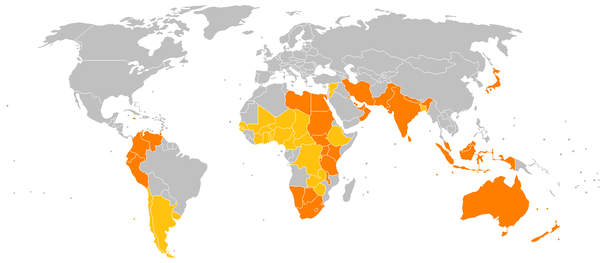
Varying sources differ slightly on exactly which countries require a carnet, however generally the following countries require a carnet for private vehicle entry.[2][3][4][5]
Africa
Required for
Recommended for
 Benin
Benin Burkina Faso
Burkina Faso Cameroon
Cameroon Central African Republic
Central African Republic Chad
Chad DR Congo
DR Congo Djibouti
Djibouti Ethiopia
Ethiopia Gambia
Gambia Ghana
Ghana Guinea-Bissau
Guinea-Bissau Ivory Coast
Ivory Coast Mali
Mali Niger
Niger Nigeria
Nigeria Rwanda
Rwanda Senegal
Senegal Togo
Togo Zambia
Zambia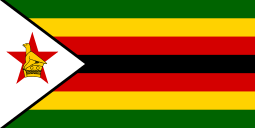 Zimbabwe
Zimbabwe
Americas
Note that as of 2016 the Carnet is rarely used on the South American continent, in spite of the lingering perceptions suggested by entries here
Required for
 Brazil[6]
Brazil[6] Colombia (only recommended according to some sources)not required if Canadian
Colombia (only recommended according to some sources)not required if Canadian Ecuador (only recommended according to some sources) not required if Canadian
Ecuador (only recommended according to some sources) not required if Canadian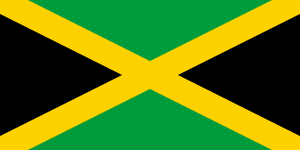 Jamaica
Jamaica Peru (only recommended according to some sources) not required if Canadian
Peru (only recommended according to some sources) not required if Canadian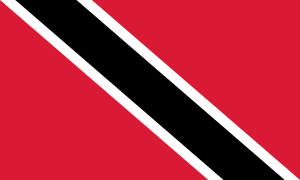 Trinidad and Tobago
Trinidad and Tobago Venezuela (only recommended according to some sources) not required if Canadian
Venezuela (only recommended according to some sources) not required if Canadian
Unless Canadian, recommended for
Asia & Middle East
Required for
 Bahrain
Bahrain Brunei
Brunei East Timor
East Timor India
India Indonesia
Indonesia Iran
Iran Japan
Japan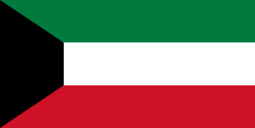 Kuwait
Kuwait Malaysia
Malaysia Nepal
Nepal Oman
Oman Pakistan
Pakistan Qatar
Qatar Singapore
Singapore Sri Lanka
Sri Lanka UAE
UAE
Recommended for
Oceania
See also
External links
- https://www.gov.uk/ata-and-cpd-carnets-export-procedures
- Alliance Internationale De Tourisme
- A Guide to Carnet de Passage for Overland Travel
- Overland travelers website explaining trip paperwork
- http://www.go-overland.com/indy/articles/carnet.php
- US and Canadian national guaranteeing association for CPDs
References
| Wikivoyage has a travel guide for Carnet de Passage. |
- ↑ "Archived copy". Archived from the original on 2012-11-26. Retrieved 2013-01-03.
- ↑ http://www.adac.de/reise_freizeit/ratgeber_reisen/fahrzeug_reisen/carnet_de_passage/default.aspx?tabid=tab1
- ↑ http://www.aa.co.za/travel/into-africa/carnet-requirements-pricing.html
- ↑ "Archived copy" (PDF). Archived from the original (PDF) on 2012-08-13. Retrieved 2013-01-03.
- ↑ http://www.tcs.ch/de/reisen-camping/reiseinfos/themen/zolldokumente.php
- ↑ only for vehicles arriving by boat, not for entry by land, see "Archived copy" (PDF). Archived from the original (PDF) on 2012-08-13. Retrieved 2013-01-03.